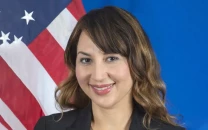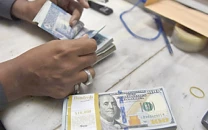Textile sector slams EFS, seeks relief
APTMA, PCGA, cotton body warn of industrial collapse; PHMA defends EFS

The All Pakistan Textile Mills Association (APTMA), Pakistan Cotton Ginners Association (PCGA), and Karachi Cotton Association have jointly demanded the removal of yarn and fabric from the Export Facilitation Scheme (EFS) and the abolition of the 18% sales tax on locally produced cotton and yarn.
Speaking at a press conference at APTMA House on Tuesday, APTMA Central Chairman Kamran Arshad, flanked by other industry leaders including Asif Inam, Naveed Ahmed, Khawaja Muhammad Zubair, Jesomal, and Sham Lal, called the policy of zero-rating imports while taxing local production "anti-national." Arshad stated that large-scale industries are deteriorating, and the withdrawal of the EFS for local industry has inflicted massive damage, leading to the shutdown of 120 spinning mills and over 800 ginning factories.
He said the textile sector had repeatedly raised concerns with policymakers, including during meetings with International Monetary Fund (IMF) officials, stressing that the industry could not sustain the burden of such heavy taxation. Arshad warned that the government must act before the industry is forced to shut down entirely or relocate abroad, noting that a looming US tariff war has added further pressure.
Arshad claimed that the EFS has brought the industry to the edge of collapse. During talks with the IMF, the delegation highlighted the financial losses the sector had faced under the EFS, but were told the matter lies within the jurisdiction of the Federal Board of Revenue (FBR). In response to these concerns, the prime minister has constituted a review committee headed by Federal Minister Ahsan Iqbal to assess the scheme.
Urging the government to curtail its own spending instead of overburdening industry, Arshad pointed to the iron and steel sector as another example of policy failure, claiming it suffered over Rs300 billion in losses under the EFS. "If the policy is not reversed, more textile mills will shut down," he warned. Karachi Cotton Association representative Sham Lal said cotton production has declined sharply — from 15 million bales to just 5 million — due to misguided government policies.
He criticised the dismantling of the state's traditional "roti, kapra, makaan" (food, clothing, shelter) slogan through flawed economic measures. With 120 spinning mills and over 800 ginning units closed, the industry is collapsing, he said, asking where imported American cotton would go if local factories continue to shut down.
Mahesh Kumar of the PCGA added that sugar mills have contributed significantly to the downfall of the cotton sector. He said the ginning industry currently holds 5.5 million bales of unsold cotton and that many ginners are now defaulting on bank loans due to the deteriorating situation.
However, not all stakeholders in the textile sector share the same view. The Pakistan Hosiery Manufacturers and Exporters Association (PHMA) criticised APTMA's stance and defended the EFS. PHMA Chairman Babar Khan called the imposition of sales tax under EFS an anti-export measure and said taxing imports within the scheme would damage the export sector. Khan stressed that value-added textile exporters rely on the EFS and are demanding its restoration to its original framework under SRO 957, as it existed before the 2024-25 federal budget. He argued this would enable the entire textile value chain to benefit from tax exemptions.
Questioning APTMA's change in position, Khan pointed out that the association had supported the scheme since 2021 but was now opposing it. He accused APTMA of misleading propaganda and of undermining the value-added sector, which, according to him, could have helped Pakistan's textile exports cross the $50 billion mark.
The PHMA chief urged the government to ensure equal opportunities for all stakeholders and to reinstate the sales tax exemption on local purchases under the EFS. He said the practice of collecting and then refunding sales tax is inefficient, especially given frequent delays in refunds. Such delays, he added, would create serious liquidity issues for exporters.























COMMENTS
Comments are moderated and generally will be posted if they are on-topic and not abusive.
For more information, please see our Comments FAQ